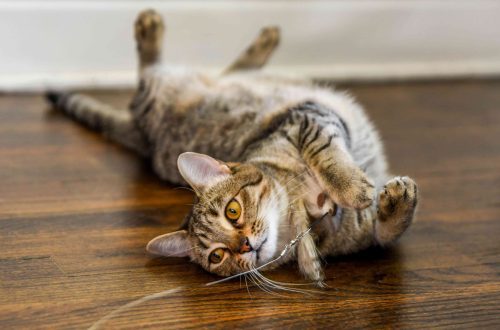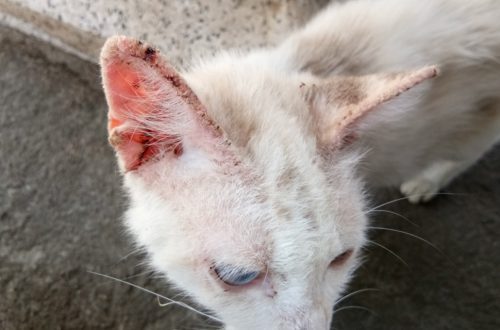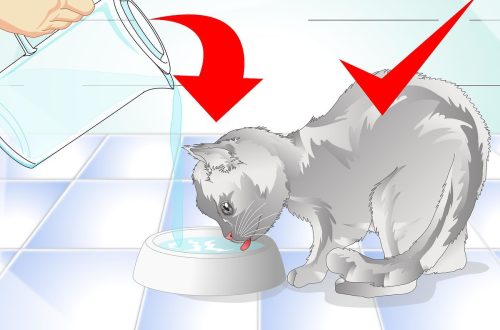
Black feces in cats – 3 causes and treatment

Contents
Causes of dark stool in cats
The normal color of feces in cats is predominantly various shades of brown. This is due to the process of digestion of food in the intestines. Stercobilin, which is formed in this case, gives the stool its usual color.
Various factors can influence the change in color and consistency of stool. It can become very dark and even almost black against the background of the consumption of certain foods and medicines. But sometimes the cause will be serious and dangerous pathologies that are accompanied by bleeding into the lumen of the stomach or intestines.
Consumption of certain foods
Eating certain foods will cause the stool to turn dark in color. For cats with their limited diet, this may include eating large amounts of raw red meat or liver. With abundant eating of raw liver, feces can also become not only dark, but also liquid.
If the change in stool color is related to food, then it lasts within 1-2 days and is not accompanied by any other symptoms.

Medications
Certain medications can also cause the color of the stool to change. For example, taking activated charcoal and preparations based on it.
Taking iron supplements will also turn feces black, and this is completely normal. Iron supplements may be used in cats with
anemicDecreased blood counts.
Also, preparations based on bismuth salts can lead to staining feces in a dark color. Currently, such drugs are used in humanitarian (human) medicine as enveloping agents for gastritis, gastric and duodenal ulcers. Similar medications may sometimes be prescribed by a veterinarian to a cat with stomach problems.
If the cat’s feces turn black while taking such drugs, this is not a reason to go to the clinic.

Bleeding in the gastrointestinal (GI) tract
This is a dangerous symptom that requires immediate veterinary attention. Why does bleeding in the gastrointestinal tract lead to dark or black stools? This is due to the interaction of hydrochloric acid of the stomach and blood hemoglobin. Therefore, this symptom is characteristic of bleeding in the esophagus and upper gastrointestinal tract – the stomach and small intestine.
The degree of staining of feces in a dark color will depend on the intensity of bleeding: from small streaks and inclusions to uniform staining. The consistency of feces in this case can be different – from dense to diarrhea.
With significant bleeding, melena can be observed – a liquid black stool of a tar-like consistency.
Black diarrhea in a cat is a very dangerous symptom! This is blood that has been released into the lumen of the stomach and intestines in a fairly large amount.
A cat is a small animal, and such bleeding in her case can lead to death. Of course, sometimes black diarrhea is a consequence of giving some drugs, the same activated charcoal. He can not stop diarrhea, but paint it black. However, it is important to be aware of melena and contact your veterinarian immediately if you suspect it.

Causes of bleeding in the gastrointestinal tract in a cat:
Foreign body. In some cases, a swallowed foreign body can significantly damage the walls of the gastrointestinal tract. And it’s not always something sharp. The same thread is able to catch on the tongue (which happens often) and, when pulled, cut through the mucous membrane of the esophagus, stomach or intestines. With foreign bodies in the gastrointestinal tract, there is pain in the abdomen, depression, vomiting, scanty or no stools, decreased appetite or a complete refusal to eat and drink.
parasitic diseases. A large number of helminths can lead to damage to the walls of the small intestine and staining of feces in a dark color. As a rule, with such parasitosis, there are other symptoms: scarlet blood and mucus in the stool, diarrhea, and vomiting. Sometimes the owner notices helminths in the pet’s stool or vomit.
Ulcers of the stomach and duodenum. They can appear against the background of significant inflammation (for example, uremic gastritis with severe kidney damage), taking certain medications (for example, Aspirin), ingestion of toxins (household chemicals, poisonous plants). Such conditions are accompanied by pain in the abdomen, vomiting, including blood and an admixture similar to coffee grounds, a decrease or lack of appetite, and diarrhea. The cat may lose weight if the problem is chronic.
Tumors of the stomach and small intestine. They are more common in middle-aged and older cats. With the disintegration or damage of tumors, bleeding can be significant. Oncological diseases are accompanied by a number of symptoms. The most common of them: weight loss, decreased appetite and activity, periodic vomiting.
Violation of blood clotting. It can also lead to bleeding in the gastrointestinal tract. The cause of the violation can be: poisoning (for example, with certain drugs from rodents), severe liver disease, taking anticoagulant drugs (may be prescribed to cats with cardiac diseases), severe liver disease, snakebite, etc. In case of clotting disorders, the cat develops multiple bleeding: from the nasal passages, oral cavity, an admixture of blood appears in the urine, feces, vomiting with blood is possible. The mucous membranes of the animal become pale, weakness develops, body temperature decreases, shortness of breath appears. On the body may appear small or spilled
hematomasbruising.
Injury. Falls from a height, car injuries, dog attacks, human aggression can lead to trauma to the digestive tract with internal bleeding. The state of the cat will depend on the degree of damage to tissues and organs: from lethargy and loss of appetite to impaired consciousness.

Diagnosis of black stool in cats
Sometimes black poop in a cat is easy to explain: the pet had diarrhea, and the owners gave him activated charcoal. The chair turned black. Is this a reason to take your pet to the vet? Probably not. After all, coal is not digested and, as expected, stains feces black.
If, after eating a raw liver, a cat has dark feces, this is also not a reason for panic, but a reason to adjust the diet.
But when the change in the color of feces cannot be explained by food and medication, this is a reason for an urgent visit to the doctor.
Diagnosing the causes of black stools is not easy. The problem is often not obvious, and a thorough examination and anamnesis do not always help the doctor to quickly navigate. What research will help to understand the situation?
Ultrasound examination necessary if you suspect inflammation in the gastrointestinal tract, tumor processes, a foreign body.
General clinical blood test very important to rule out anemia. With significant bleeding, the body cannot instantly replenish red blood, the same situation develops with regular bleeding of a small volume.
X-ray examination necessary for injuries and foreign bodies.
Endoscopic examination of the esophagus and gastrointestinal tract necessary for suspected ulcerative processes, tumors, and also helps with the detection and extraction of foreign bodies from the esophagus, stomach and duodenum.
Coagulogram. Specific blood test to assess clotting. Required if a bleeding disorder is suspected.
Fecal occult blood test. A complex and controversial analysis in veterinary medicine, and rarely resorted to. In order to examine the feces for occult blood, you need a diet completely devoid of meat products. This means that within 3-4 days the cat will have to eat dairy products, cereals and tofu. And in a healthy animal, such an unusual diet will provoke problems with the gastrointestinal tract, and even more so in a patient. But even if the analysis turns out to be positive, this will only be an occasion for further research and the search for the cause of bleeding in the gastrointestinal tract.

Treatment
Speaking about the treatment of black feces in a cat, we mean the treatment of the causes of bleeding into the lumen of the esophagus and gastrointestinal tract.
With foreign bodies, their extraction is necessary. For this, surgical or endoscopic intervention is used.
Also, surgery is often necessary in oncological processes if the tumor can still be removed.
An operation may also be necessary for perforated ulcers: when the wall of the esophagus or gastrointestinal tract is affected through and through.
With significant inflammation of the stomach and intestines, enveloping agents (Almagel, Phosphalugel, Sucralfate, De-nol), gastroprotectors (Famotidine, Omeprazole) can be used. Gastroprotectors and enveloping agents reduce the production of hydrochloric acid in the stomach or neutralize it, thereby helping to restore the mucosa. Sucralfate and bismuth salts (De-nol) react with the damaged mucosa and “seal” it.
If the cause of black feces in a cat is a blood clotting disorder, then the treatment can be varied. For example, when poisoned by some
rodenticidesRodent Remedies vitamin K1 is used.
Almost all cases of severe bleeding require a blood transfusion.

Kitten has black feces
In kittens, bleeding into the lumen of the gastrointestinal tract is a very rare problem. But even a small amount of blood from the upper gastrointestinal tract can make a kitten’s feces dark due to the very small size of the animal.
In kittens, worms can cause dark feces. It is not uncommon for a kitten with helminthiasis to have diarrhea, vomiting, and visible blood and mucus in the feces. It is also possible to increase the volume of the abdominal cavity and poor weight gain.
Kittens actively explore the world around them, including by trying it on the tooth, and the risk of swallowing foreign bodies is high. They can also cause black poop in a kitten.

Prevention
A safe environment for the cat with no toxins, medicines and poisonous plants in the public domain
Do not leave small objects, threads, which the cat can swallow during the game, within reach
Do not allow uncontrolled walking of a cat on the street
Timely carry out preventive procedures: vaccination, treatment against parasites
Regularly (1-2 times a year) conduct preventive examinations for middle-aged and elderly cats. These may include an abdominal ultrasound and basic blood tests.

Black feces in cats – the main thing
The reason why the cat’s stool turned black may be: the composition of the diet, taking certain medications, a disease with blood entering the lumen of the esophagus, stomach or small intestine.
Most often, dark feces will be due to a number of products: raw red meat, liver.
Medications that can stain a cat’s stool black: activated charcoal, iron preparations and bismuth salts.
Bleeding in the upper gastrointestinal tract and in the esophagus can stain feces dark and black. This is due to the interaction of blood hemoglobin with hydrochloric acid in the stomach.
Bleeding in the gastrointestinal tract is not a frequent symptom, but can accompany a number of pathologies. The reasons may be: foreign bodies, ulcers, tumor processes of the stomach and small intestine, trauma, impaired blood clotting.
The most dangerous symptom will be melena – black, tarry, unformed stools. It is characteristic of significant bleeding in the gastrointestinal tract, and for such a small animal as a cat, this can be fatal.
Diagnosis of the causes of dark stools will be complex and may include blood tests and imaging methods: ultrasound, x-rays, endoscopy.
Treatments for the causes of dark stools range from coatings, gastroprotectors, and correction of clotting disorders to surgery. If there is significant bleeding, a blood transfusion is required.
Answers to frequently asked questions
Sources:
Gary D. Norsworthy “The feline patient”, (Cat Patient), 2018.
E. D. Hall, D. W. Simpson, D. A. Williams, Canine and Cat Gastroenterology, 2010.





